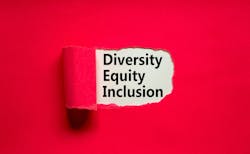One MD Leader Looks at the Challenges Facing DEI Efforts
With efforts to advance DEI—diversity, equity, and inclusion—under fire nationwide, one DEI leader has authored a “Perspectives” opinion piece in The New England Journal of Medicine, sharing her perspectives on the challenges facing a movement that continues to experience broad support in patient care organizations throughout the U.S., but which has become the subject of wide-ranging debate in the political world.
In an op-ed published online on March 20 and entitled “The Plight of DEI Leaders—Heavy Expectations and Limited Protection,” Aletha Maybank, M.D., M.P.H., who has been senior vice president and chief health equity officer at the American Medical Association since April 2019, explains how this moment is a fraught one for those working to advance diversity, equity, and inclusion in healthcare, even as broad consensus exists that such efforts have value and should be pursued. Dr. Maybank notes that “Advancing workplace DEI as hired DEI, equity, or health equity officers — whether in health systems, academia, or corporations — has always been tough, but it is especially rough right now. Not only are our long-standing efforts and those of many leaders who came before us being attacked, so are we — and directly. Since the public murder of George Floyd opened a door for speaking more directly about racism, some of us are increasingly receiving violent and abhorrent messages, even death threats at our homes. All this aggression seeks to silence us, with the larger goal of shutting this opened door forever.”
And, she notes, “The latest attack comes from my own profession: a small group of physicians from within one medical specialty society proposed a resolution, that was fortunately defeated by vote, to ‘sunset’ all DEI efforts. It is important to remember that eliminating DEI efforts negatively affects not only Black people, but all racially and religiously marginalized groups, Indigenous people, women, non-Christians, people with disabilities, and LGBTQ+ people.”
What’s more, Maybank writes, “In addition, we DEI leaders face growing aggression within our workplaces and even within our equity and justice networks. Most recently, my DEI colleagues and I, particularly the Black women among us, are being scapegoated for our institutions’ decisions — such as to not issue position or advocacy statements in support of health justice in various parts of the world — which we have no power to make on our institutions’ behalf.” It is important, she emphasizes, for people to understand that when patient care organizations commit to certain goals and efforts, those decisions then become the responsibility of senior leaders in those organizations to support. Put simply, she says, “We are not our institutions. We are never fooled about this reality. Some observers see us as too disruptive. Others believe we don’t disrupt enough. Though I know we signed up to take on these roles, the range of expectations we face feels chaotic.”
The reality, Maybank underscores, is that chief DEI officers and others working to develop and implement DEI policies, have to engage in very complex internal discussions and negotiations that can’t always be made transparent. As she puts it, “The work is highly strategic, at times technical and specific. Chief health equity officers like me push to change culture, practices, and policies inside institutions to try to ensure equity and health for everyone, not just a select few. DEI work requires a good amount of effort that happens openly, and some that is exerted behind closed doors, where we are often required to maneuver through difficult conversations aimed at convincing people to care about something they may be unfamiliar with.”
Maybank concludes her op-ed by emphasizing that “[R]ight now, we DEI practitioners and our work deserve more support, not less, in the same way that all people experiencing violence do — whether the violence takes the form of bullying, genocide, homicide, or suicide, and whether it occurs in the workplace, our homes, or our neighborhoods. We deserve work environments that are “trauma informed.” We deserve to have our institutions provide us with greater (physical and cyber) security and safety protections both in and outside the workplace. And in this moment in history, as we witness the mounting destruction of DEI efforts, we need more leaders and colleagues, especially from within our institutions, who will show up not only with us, but for us.”


